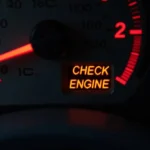The Foxwell OBD2 code P0301 indicates a detected misfire in cylinder 1 of your vehicle’s engine. A misfire occurs when the air-fuel mixture in a cylinder fails to ignite properly, causing a disruption in the engine’s combustion cycle. This can lead to a range of performance issues and potential damage if left unaddressed. This article provides a comprehensive guide to understanding, diagnosing, and resolving the P0301 code, specifically focusing on insights relevant to Foxwell OBD2 scanner users.
Understanding the P0301 Code
The P0301 code specifically identifies cylinder 1 as the source of the misfire. Your engine’s cylinders fire in a precise sequence to ensure smooth and efficient operation. When cylinder 1 misfires, it disrupts this sequence, leading to noticeable performance problems. Recognizing these symptoms can help you address the issue promptly.
Common Symptoms of a P0301 Code
A P0301 code can manifest through various symptoms, ranging in severity from subtle to significant performance issues:
- Check Engine Light: The most obvious indicator is the illumination of your vehicle’s check engine light.
- Engine Misfires: You may experience noticeable engine misfires, often felt as a jerking or sputtering sensation, especially during acceleration.
- Rough Idle: The engine may idle roughly or unevenly, especially when the vehicle is stationary.
- Reduced Power and Acceleration: A misfiring cylinder can significantly impact engine performance, leading to reduced power output and sluggish acceleration.
- Increased Fuel Consumption: As the engine works harder to compensate for the misfiring cylinder, fuel consumption may increase.
Common Causes of a P0301 Code
The P0301 code can stem from several potential culprits within your vehicle’s engine system. It’s crucial to investigate and address the root cause to effectively resolve the misfire issue. Here’s a breakdown of common causes:
-
Faulty Spark Plug: A worn-out, damaged, or fouled spark plug in cylinder 1 is the most common culprit behind a P0301 code. The spark plug provides the electrical spark necessary to ignite the air-fuel mixture. If it’s not functioning correctly, it can lead to misfires.
-
Faulty Ignition Coil: The ignition coil provides the high voltage necessary for the spark plug to fire. A failing ignition coil may not deliver sufficient voltage, leading to weak or inconsistent sparks and, consequently, misfires.
-
Vacuum Leak: A vacuum leak in the intake manifold or related components can disrupt the air-fuel ratio entering cylinder 1. This imbalance can prevent proper combustion, leading to misfires.
-
Fuel Injector Problems: A clogged, dirty, or malfunctioning fuel injector responsible for cylinder 1 can disrupt fuel delivery. Insufficient or inconsistent fuel supply can cause misfires.
-
Compression Issues: Low compression in cylinder 1, often caused by worn piston rings, a damaged cylinder head gasket, or other mechanical issues, can prevent proper combustion and lead to misfires.
Diagnosing the P0301 Code Using a Foxwell OBD2 Scanner
A Foxwell OBD2 scanner proves invaluable in diagnosing the P0301 code and identifying the root cause of the misfire. Follow these steps to effectively diagnose the issue:
- Connect the Scanner: Connect your Foxwell OBD2 scanner to your vehicle’s OBD2 port, typically located under the dashboard on the driver’s side.
- Read Codes: Turn on the ignition but don’t start the engine. Access the scanner’s diagnostic menu and select “Read Codes” or a similar option to retrieve stored trouble codes.
- Identify P0301: Look for the P0301 code within the list of retrieved codes. If present, it confirms a misfire in cylinder 1.
- Live Data Stream: Access the scanner’s live data stream to monitor engine parameters in real-time. Focus on readings related to cylinder 1, such as:
- Misfire Count: This parameter displays the number of misfires detected in cylinder 1.
- Fuel Trim: Short-term and long-term fuel trim readings indicate adjustments made to the air-fuel ratio. Deviations from normal ranges can suggest fuel delivery or vacuum leak issues.
- Ignition System Parameters: Observe readings related to ignition coil voltage, spark duration, and other relevant parameters to assess ignition system health.
- Isolate the Cause: By analyzing the P0301 code alongside live data stream readings, you can begin isolating the most likely cause of the misfire.
- For instance, a high misfire count accompanied by abnormal fuel trim readings might point to a fuel injector problem.
- In contrast, erratic ignition system parameters could indicate a faulty ignition coil or spark plug.
 Mechanic using Foxwell OBD2 scanner to diagnose car engine
Mechanic using Foxwell OBD2 scanner to diagnose car engine
How to Fix a P0301 Code
Once you’ve identified the root cause of the P0301 code using your Foxwell OBD2 scanner and potentially other diagnostic tools, you can proceed with the appropriate repairs. Here’s a general guide to fixing common causes:
- Replace Faulty Spark Plug: If the spark plug in cylinder 1 is worn out, damaged, or fouled, replacing it is a straightforward solution. Always use the recommended spark plug type and gap for your vehicle.
- Replace Faulty Ignition Coil: If the ignition coil for cylinder 1 is faulty, replacing it is crucial to restore proper spark delivery and eliminate misfires.
- Repair Vacuum Leaks: Thoroughly inspect the intake manifold, vacuum hoses, and related components for any leaks. Repair or replace any damaged or leaking parts to restore proper air-fuel ratio.
- Clean or Replace Fuel Injectors: If a clogged or dirty fuel injector is identified, try cleaning it using a fuel injector cleaner additive or professionally. If cleaning proves ineffective, replace the faulty injector.
- Address Compression Issues: If low compression in cylinder 1 is diagnosed, it requires more involved repairs. Consult a qualified mechanic to address issues such as worn piston rings or a damaged cylinder head gasket.
Conclusion
The Foxwell OBD2 code P0301, while potentially disruptive, is typically resolvable with proper diagnosis and repair. Your Foxwell OBD2 scanner empowers you to understand the code, identify the root cause of the misfire, and proceed with targeted solutions. Regular vehicle maintenance, timely repairs, and using your Foxwell scanner for proactive diagnostics can help prevent future occurrences of the P0301 code and ensure optimal engine performance.

